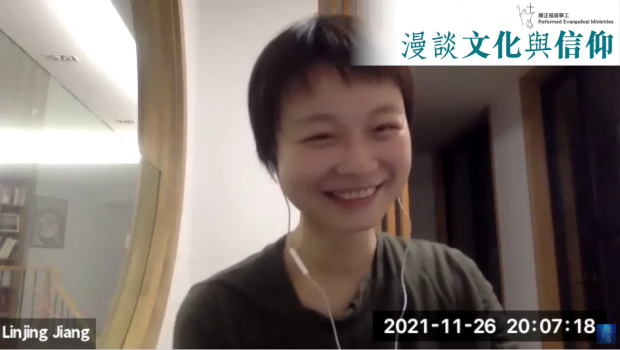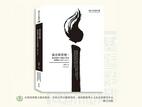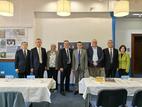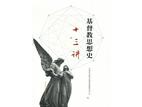Jiang Linjing, a Chinese Christian intellectual, shared how the Christian faith ignited her passion for art and culture.
Jiang, associate professor of the German Language and Literature Department at Fudan University holding a doctor's degree in German Literature from Heidelberg University, Germany, delivered an online lecture titled “Culture and Faith” on November 30.
Organized by the Reformed Evangelical Ministries in Hong Kong, the lecture was hosted by Dr. Shao Kai Tseng, a researcher at the Institute of Religion in the Department of Philosophy of Zhejiang University and a former assistant professor of systematic theology in China Evangelical Theological Seminary.
The passion for art and underpainting of life inherited from her Christian family members
In the lecture, Professor Jiang Linjing started by stating that her passion for art and music came from her Christian family members, joking that she was the third generation of “Christians of art and literature”.
The scholar's grandmother was the first in her family to come to Christ. When she was a child, she went to church with her grandmother who also influenced her father, Jiang Yuanlai, who was baptized in the late 1990s. Due to the divergence between her parents, when she was seven, she was raised by her mother alone, but she also had some time to be together with her father and grandmother. During the short time spent with her father, Jiang would spend half a day with her father buying music cassettes in a music store in Shanghai. When she brought them home, she would listen to them repeatedly. When Jiang got together with her father and grandmother, she would talk about her favorites from the cassettes.
At that time, domestic music resources were scarce. When she got her favorite classical music cassettes, Jiang would cherish the scarce ‘manna’ in her hands like the Israelites in the wilderness and she listened and listened. Then, when a radio station played classical music tracks, she would quickly record them on empty tapes and chew on them over and over again.
Meanwhile, her Christian grandmother would often teach her to rely on God if she became sad. In her little mind, God was an existence of being, an imaginary friend. When she missed her grandmother and father, she would imagine holding hands with God and singing hymns next to them. The grandmother had always told her to always pray for her mother who had worked hard to raise her. Therefore, since she was a child, she developed a habit of recording what was to be prayed on a tape, and even when she was a graduate student, she would put her daily prayers in a notebook. In her view, God was a true and intimate friend.
Until she went to study abroad in Heidelberg, Germany, she met like-minded Chinese Christian friends with whom she read scriptures, prayed, and sang hymns together. So, then the “private” God gradually changed into “our” God and His image became much richer.
Choosing the German language and literature major to understand German music
Professor Jiang introduced the fact that she majored in physics in high school but was the only student in the science class to choose to study literature in the university. Since she began to learn English, she would secretly recite Emily Dickinson’s poems because the language was simple, and the content connected the poet with God.
Moreover, her grandmother particularly liked the works of Russian novelist Leo Tolstoy, while her father preferred Fyodor Dostoevsky. On every winter and summer vacation from junior to senior high school, she would read a novel written by these two Russian literary giants. Eager to read the Russian original novels, she once was planning to apply for the Russian major. Unfortunately, Fudan University at that time only recruited Russian major students every other year, and it happened that its Russian major department didn’t enroll students in that year when she sat gaokao, China's national college entrance examination. She went to Shanghai International Studies University to study German, for at least she could use German to understand what German composer Richard Wagner’s operas or Franz Schubert’s song circles were conveying. She even wanted to understand the instructions printed in German on cassette covers.
The influence of faith on the study of German culture
When Professor Jiang was a student, she experienced great confusion: the poems written by German poet Friedrich Hölderlin and the biographies written by Austrian writer Stefan Zweig did not reflect many Christian elements, but Holderling’s works showed a mixture of non-Christian elements and polytheism.
Although Holderlin studied Christian theology, she would not directly judge whether he was a pantheist first, but first face directly his writings, because his works included thinking about God in the world. She would think about how his writings became a bridge between me, nature, and God; she would regard him as a “reconciler”. When the bridge of communication or the power of life was established between the reader and the poet, she went on to see whether the power belonged to the gods or to Christ. There might be the possibility of misreading and misjudgment in the process, so she would make the process of judgment as slow as possible and would not enter the theological dimension too soon.
It was like in a church service where everyone yelled “Halleluiah, praise the Lord”. While praising, everyone might have their own schemes or invisible abysses in their hearts. The difference between theology and literature was the individuals who embodied in the community. When dealing with literature, there would be a variety of noises in joint praise, and God would not reject the praise because of the different noises.
Dr. Shao Kai Tseng responded with the idea that when theologians evaluated literature, music, or theology, the first attitude they should hold was to “listen quickly and respond slowly”. Otherwise, they would easily be in a position of overstepping God. When there was something in the poem that touched you, we could not deny that there was divine brilliance in me, there was also the created and fallen humanity as part of me. We should feel for the author’s situation and sympathize with and appreciate the literary works.
The role of music in the Reformation deserving attention
In her book The Art of German Music-Poetry, in which she analyzes 19 German songs (Kunstlied) and poems, the first poem is “Lord, Keep Us Steadfast in Thy Word" written by Martin Luther, the father of the Reformation.
It is not commonly known that when Luther translated the Latin Bible into German, he wrote more than 40 hymns at the same time, and then asked excellent composers to compose music for them. Therefore, he was also called “The Nightingale of Wittenburg”. Luther once said that if he didn’t become a theologian, he would have become a musician. Luther’s theology attached great importance to freedom, and his poem “Ms. Music” ("Frau Musika") mentioned that King David used the harp to exorcise Saul’s demons, admiring that music could help people enjoy freedom and joy.
Later, Hans Sachs, a follower of Luther, wrote a long doggerel “The Nightingale of Wittenburg”, which made people familiar with Luther’s contribution to the religious reform. Richard Wagner, a famous German composer, based on his poem, created “The Famous Singer of Nuremberg”, making him a German song master. Therefore, the role of music deserved attention during the Reformation period.
- Translated by Charlie Li












